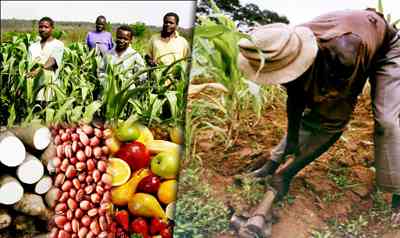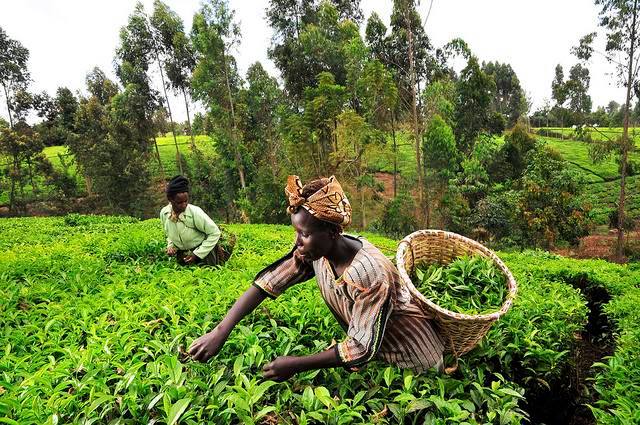By Arize Nwobu
The Central Bank of Nigeria (CBN) has triggered a growing interest and return to agriculture through various innovative policy initiatives which supports farmers and protects lenders.
The importance of agriculture in enabling economic growth and sustainable development cannot be overemphasized. Agriculture has been described as the root of civilization, starting chain of the economy and a base for the daily life. It encourages hard work, provides food and raw materials, improves standard of living of the people, increases exports, reduce imports and balance of trade.
Join our WhatsApp ChannelExperts have noted that more than 65 per cent of industries and business activities are supported by agriculture.
Prior to the industrial revolution agriculture was the primary source of economies. Many advanced economies developed on the back of agriculture before they diversified into other sectors in the chain of economic growth and development. Nigeria was on the same trajectory before it was truncated by the advent of oil and petrodollar which relegated agriculture to the background.
But with the initiatives of CBN, farming which encompasses a wide range of activities is beginning to regain the lost reputation which is a good development for the economy. The initiatives have given small holder farmers the latitude to approach commercial banks and access loans which hitherto they could not do.
Statistics show that there are presently about 4.8 million small holder farmers who have accessed loans through the various initiatives, and the results are manifesting especially in rice production which has increased from 4.0 metric tonnes annually in 2015 to 7.5 million tonnes presently.
In order to move closer and make the various initiatives more accessible to farmers CBN opened development finances offices in all its branch offices.
In a press report the Bank noted that ‘’apart from the Head Office of the Central Bank of Nigeria, Development Finance Offices have been established in all branches of the Central Bank to administer the Agriculture Credit Guarantee Scheme ‘’, but it further noted that the agriculture loans must be used strictly for the purposes for which they were obtained and that to do otherwise would attract a five- year jail term.
Among the various initiatives, the Anchor Borrowers’ Programme (ABP) which was established in 2015 seems to be the arrowhead and most notable. The ABP was established in accordance with CBN’s development functions after consultations with stakeholders which comprised the Federal Ministry of Agriculture and Rural Development, State governments, Agro Processors, Commodity Associations, Financial Institutions and Small holder farmers.
The objectives are to create a new generation of farmers through innovative financing to support agriculture and deepen financial inclusion and grow small holder farmers from subsistence to commercial farming, to increase banks’ financing to improve agricultural productivity by creating an ecosystem that drives value chain financing, reduce the nation’s food import bill through import substitution and enhanced value addition.
The target agricultural commodities include rice, maize, wheat and other cereals, cassava, potato and yam. Others include oil palm, tomato, cocoa, rubber, ginger, fish, poultry, other livestock and other commodities that may be determined by CBN.
Besides the ABP, other such policy initiatives by CBN include the Agriculture Credit Guarantee Scheme (ACGS), Commercial Agriculture Credit Scheme, Agriculture Support Scheme, Nigerian Incentive-Based Risk Sharing in Agricultural Lending Programme (NISRAL) and Interest Draw-back Programme.
Reports indicate that NISRAL had facilitated the flow of over N73 billion into Nigeria’s agro processing industry and the beneficiaries include pre-upstream, upstream and downstream operators in the Agricultural Value Chain (AVC) who are involved in inputs, production and supply, mechanization service provision, primary production and logistics.
To further support farmers and agribusinesses, NISRAL rewards diligent borrowers through the Interest Drawback (IDB) Scheme which offers discretionary rebates of up to 40 per cent of interest paid on NISRAL’s Credit Risk Guarantee (CRG) loans. CRG is NISRAL’S product used to share agribusiness-related credit risks with commercial banks and financiers by up to 75 per cent depending on the segment that CRG applicants operate in.
The arrangement protects financiers from possible losses in a credit transaction and boosts their confidence lend which in turn makes it possible for farmer groups and agribusinesses to secure loan approvals from bank.
The growing interest in agriculture is said to have created a huge impact in the economy in the past six years. According to the CBN governor, Godwin Emefiele, ‘’our medium-term goal is to fast-track growth above historic average.
Economic activities may reach pre-pandemic levels if the resilience of non-oil activities (especially agriculture and manufacturing sectors) are given continued impetus.’’
Experts have noted that some of the most lucrative agriculture and farming businesses are cassava (about 90 per cent of Nigerian households consume cassava products everyday), poultry farming (demand for poultry products are quite high), rice and snail farming. Others are catfish farming, maize farming, pig farming and honey bee farming.
Nwobu, a Lagos-based Chartered Stockbroker and Business Journalist wrote via arizenwobu@yahoo.com Tel: 08033021230


















Follow Us